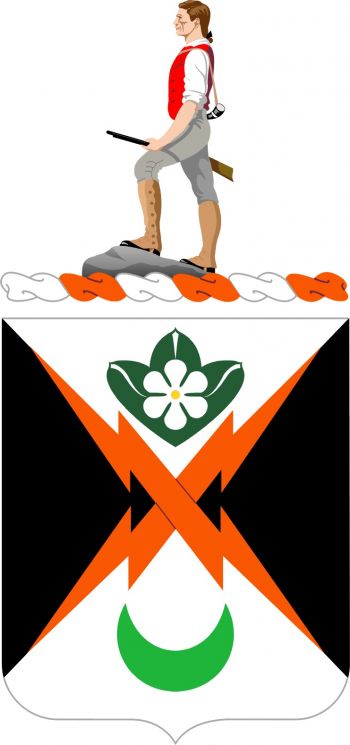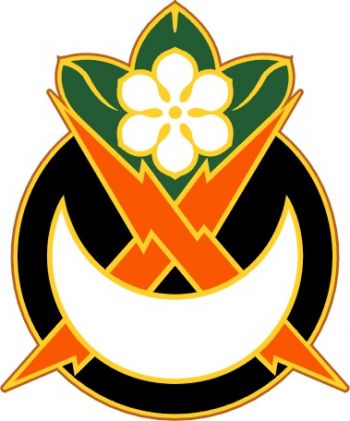845th Signal Battalion, US Army
845TH SIGNAL BATTALION, US ARMY
| (Coat of Arms) |
(Distinctive Unit Insignia) |
Official blazon
Shield: Per saltire Argent and Sable two lightning bolts in saltire Tenné between in chief a stylized magnolia blossom leaved of three Proper and in base a crescent Vert.
Crest: That for the regiments and separate battalion of the Army Reserve: On a wreath of the colors, Argent and Sable, the Lexington Minute Man Proper. The statue of the Minute Man, Captain John Parker (H.H. Kitson, sculptor), stands on the Common in Lexington, Massachusetts.
Distinctive Unit Insignia. Description: A gold color metal and enamel device 1 1/8 inches (2.86cm) in height overall consisting of a black enamel disc bearing two orange enamel lightning flashes crossed saltirewise and extending over the disc, at the top between the lightning flashes a stylized white enamel magnolia blossom with three green leaves, in base surmounted overall a white enamel crescent with points up.
Origin/meaning
Shield: The crossed lightning flashes symbolize the unit’s ability to readily support with signal communications facilities. The three magnolia leaves and blossom, the state flower of Mississippi, represent the 845th Signal Battalion’s home area of Pascagoula, Mississippi, and its assignment at one time to the Third U.S. Army. The crescent, a symbol of North Africa, refers to the unit’s campaign service in North Africa during World War II. The colors black and white allude to day and night alertness, while orange is a colors used for Signal units.
Distinctive Unit Insignia: The crossed lightning flashes symbolize the unit’s ability to readily support with signal communications facilities. The three magnolia leaves and blossom, the state flower of Mississippi, represent the 845th Signal Battalion’s home area, Third U.S. Army, and the location of the organization’s last activation at Pascagoula, Mississippi. The crescent, a symbol of North Africa, refers to the unit’s campaign service in North Africa during World War II. The colors black and white are used here to symbolize day and night alertness, while orange is a colors used for Signal units.
The arms were approved on 16 April 1997. The Distinctive Unit Insignia was approved on 15 April 1969.
Contact and Support
Partners:
Your logo here ?
Contact us
© since 1995, Heraldry of the World, Ralf Hartemink 
Index of the site
Literature: The Institute of Heraldry, US Army.











